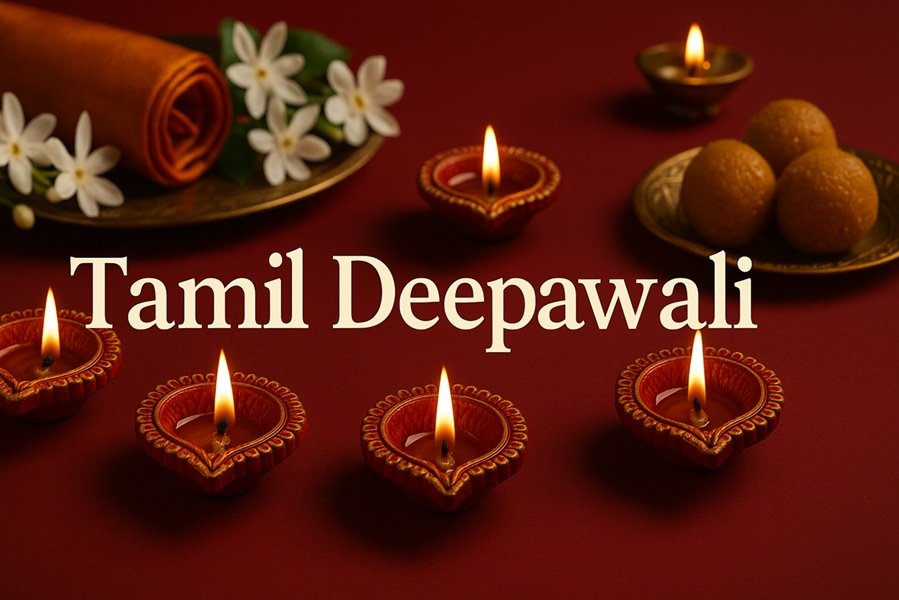
Overview
Deepavali, also known as Diwali, is one of the most celebrated and spiritually uplifting festivals in India. While North India observes it as the festival marking the return of Lord Rama to Ayodhya, in Tamil Nadu and South India, it holds a unique spiritual and cultural essence — symbolizing the victory of Lord Krishna over the demon Narakasura.
In 2025, Tamil Deepavali will be observed on Monday, October 20, 2025. The festival’s observance begins before sunrise, with sacred rituals, oil baths, and lighting of lamps to dispel darkness and ignorance.
Read this: தமிழ் தீபாவளி 2025: தேதி, முகூர்த்தம், வழிபாட்டு முறைகள் மற்றும் ஆன்மீக அர்த்தம்
Tamil Deepavali 2025 Date and Muhurat
- Tamil Deepavali Date: Monday, October 20, 2025
- Deepavali Muhurat (Before Sunrise): 05:13 AM to 06:25 AM
- Duration: 01 Hour 12 Minutes
- Sathuradasi Tithi Begins: 01:51 PM on October 19, 2025
- Sathuradasi Tithi Ends: 03:44 PM on October 20, 2025
Note: All timings are based on local time in New Delhi, India, with applicable DST adjustments.
In Panchang calculations, a day starts and ends with sunrise. Hours that extend beyond midnight are denoted with the next day’s date.
The Spiritual Essence of Tamil Deepavali
Unlike the North Indian tradition where Diwali coincides with Amavasya (new moon), Tamil Deepavali is observed during Chaturdashi Tithi, one day before Amavasya. The festival is deeply rooted in the story of Lord Krishna’s triumph over Narakasura, the asura who had imprisoned thousands of women and terrorized the heavens.
According to legend, Lord Krishna, with the help of his consort Satyabhama, defeated the demon and liberated the captives. The slaying of Narakasura symbolizes the destruction of ignorance and ego, while the lighting of lamps represents the dawn of knowledge and righteousness.
Thus, Deepavali in Tamil Nadu is not just a festival of lights but also of spiritual awakening and self-purification.
Significance of the Muhurat and Rituals
The Deepavali Muhurat that falls before sunrise (between 05:13 AM and 06:25 AM) is considered extremely auspicious. This sacred time usually overlaps with the Brahma Muhurat, a period that is spiritually powerful for performing religious rituals, prayers, and meditation.
1. The Oil Bath (Ganga Snanam)
The day begins with the ritual oil bath, which is an essential part of Tamil Deepavali traditions. It is believed that taking an oil bath during the Brahma Muhurat cleanses the body, mind, and soul. Families prepare a mixture of sesame oil and peppercorns, blessed and applied to the head before bathing.
This act symbolizes the washing away of sins, negativity, and past burdens, welcoming new beginnings.
2. Wearing New Clothes
After the sacred bath, people wear new traditional clothes, signifying renewal and prosperity. Men typically wear veshti (dhoti) and angavastram, while women adorn themselves in beautiful silk sarees and jewelry. The aroma of incense and the sound of conch shells mark the start of the celebrations.
3. Lighting Lamps and Decorating Homes
Homes are cleaned, decorated with kolams (rangoli), and illuminated with deepams (earthen lamps). Each lamp symbolizes the triumph of light over darkness and knowledge over ignorance. The flickering flames create a serene and divine atmosphere across Tamil households.
4. Puja and Prayers
Special Lakshmi Puja and Krishna Puja are performed to seek blessings for prosperity, happiness, and spiritual enlightenment. Offerings of sweets, fruits, and flowers are made, and traditional Deepavali lehyam (a herbal preparation) is consumed to aid digestion and health during festive feasting.
5. Crackers and Celebrations
After the morning rituals, the air fills with joy and laughter as families burst Puja crackers — a symbolic act representing the destruction of evil and negativity. Children enjoy the festive sounds and lights, while elders bless the younger generation with happiness and success.
North Indian Deepavali 2025
Interestingly, in North India, Deepavali will also be celebrated on Monday, October 20, 2025, but with a different significance.
While Tamilians observe the Naraka Chaturdashi, North Indians celebrate Amavasya Tithi as the day of Lakshmi Puja, honoring the goddess of wealth and fortune. Homes and temples glow with diyas as devotees invite Mata Lakshmi into their homes for abundance and peace.
Thus, though the cultural expressions vary, the underlying spirit of both festivals — the victory of light, truth, and goodness — remains the same.
Traditional Tamil Deepavali Delicacies
No festival in Tamil Nadu is complete without its sumptuous cuisine. Some popular Deepavali dishes include:
- Adhirasam – a sweet made from jaggery and rice flour, deep-fried to perfection.
- Murukku – crunchy and savory spirals made from rice and urad dal flour.
- Mysore Pak – a rich sweet made with ghee, sugar, and gram flour.
- Deepavali Lehyam – a special herbal paste consumed early in the morning to balance the body after festive feasting.
- Mixture and Seedai – spicy and crispy snacks that complete the festive platter.
Families exchange sweets with neighbors and friends, reinforcing bonds of love and unity.
Cultural Harmony and Message
Tamil Deepavali goes beyond rituals — it is a time for family reunion, forgiveness, and spreading happiness. The lighting of lamps represents not just physical illumination, but also the awakening of the inner light that drives away ignorance, hatred, and darkness.
The festival reminds every devotee that real Deepavali is the awakening of the soul, the victory of good thoughts over evil tendencies, and the illumination of truth in our hearts.
Conclusion
Tamil Deepavali 2025, falling on Monday, October 20, offers a divine opportunity for renewal and reflection. With rituals starting before sunrise, sacred oil baths, and the glow of countless lamps, it is a festival that celebrates purity, prosperity, and positivity.
As lamps flicker in every home and hearts fill with joy, may this Deepavali bring light, wisdom, and endless happiness into everyone’s life.
🪔 Wishing you and your family a Blessed and Joyful Tamil Deepavali 2025! May light triumph over darkness, today and always.





